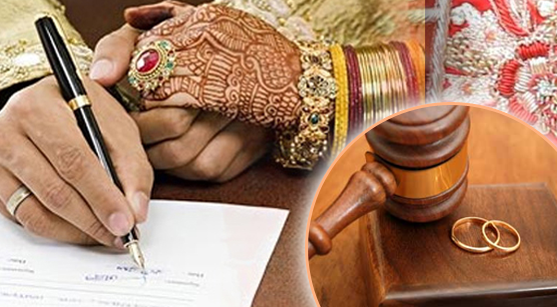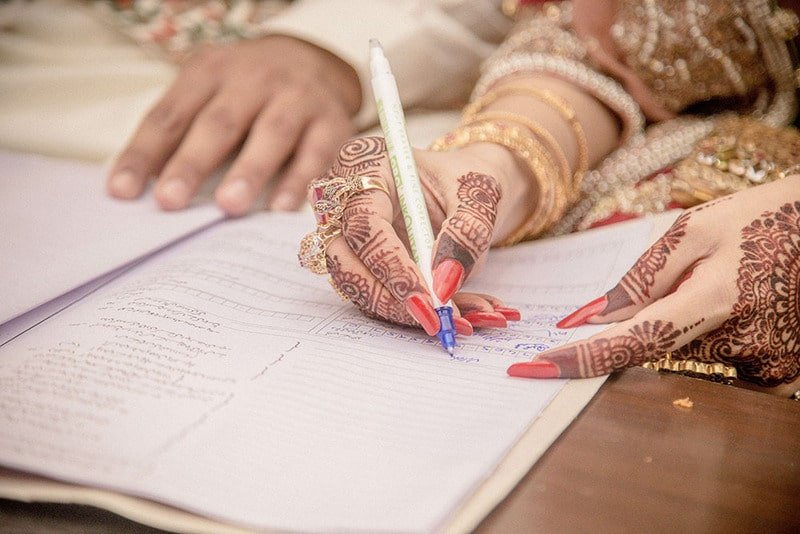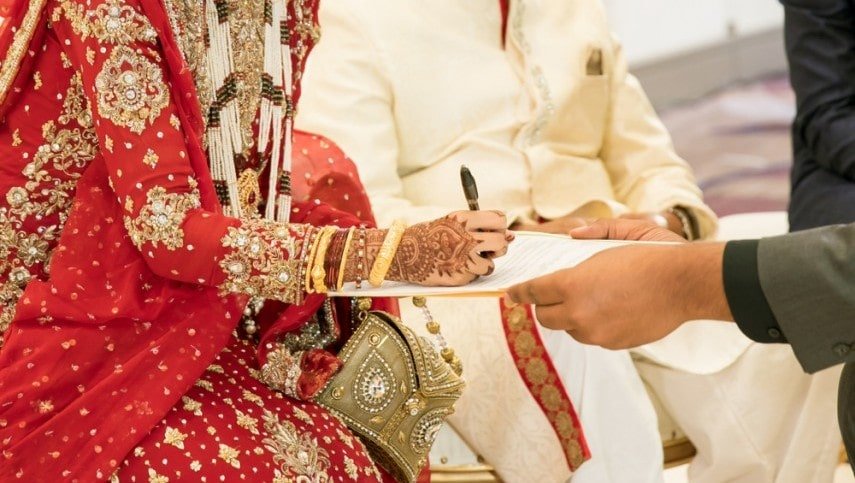Court Marriage in Islamabad, Rawalpindi & Karachi-PAKISTAN
Court Marriage in Islamabad, Rawalpindi & Karachi-PAKISTAN: Our court marriage services in Karachi, Islamabad and Rawalpindi are the best & court marriage fees/cost is the lowest. We offer court marriage service with registered marriage documents, Nikah Nama & NADRA Marriage Certificate a very reasonable legal fees.
Court Marriage-A Comprehensive Guide
Court marriage, also known as civil marriage or registry marriage, is a legal and formal union between two individuals that is performed in a court of law. It is a simple and quick process that does not require elaborate ceremonies or religious rituals. Many couples opt for court marriage due to its simplicity and convenience.
If you are considering court marriage, there are a few things that you need to know to ensure that the process is smooth and hassle-free. In this comprehensive guide, we will cover everything you need to know about court marriage, from the legal requirements to the documentation process and the rights and responsibilities of the couple after the marriage.
Embarking on the journey of court marriage unveils a path where love and legality intersect. Exploring the Legal Path to Court Marriage navigates the complexities, offering couples a detailed roadmap to formalize their commitment, ensuring a union that’s both heartwarming and legally sound.
Legal Requirements for Court Marriage
The legal requirements for court marriage may vary depending on the country or state you reside in. In general, the following are the common requirements for court marriage:
Age: The legal age for marriage varies from country to country. In most countries, the legal age for marriage is 18 years. However, in some countries, minors can get married with the consent of their parents or legal guardians.
Identity Proof: Both the bride and the groom need to provide identity proof, such as a passport or a driver’s license, to prove their age and identity.
Address Proof: The couple needs to provide address proof, such as a utility bill or a bank statement, to prove their current address.
Marital Status: The couple needs to provide proof of their marital status, such as a divorce decree or a death certificate of their previous spouse, if any.
Witnesses: Most countries require two witnesses to be present during the court marriage ceremony.
Documentation Process for Court Marriage
The documentation process for court marriage may also vary depending on the country or state you reside in. In Pakistan, the following are the common documents required for court marriage:
National Identity Cards: The couple should have their identification documents, such as CNIC/NADRA Form B or Passport.
Affidavit: The couple (especially the bride) needs to provide an affidavit of free will for the Nikah with their free consent without any pressure.
Photographs: The couple needs to provide six recent passport-sized photographs of both, the bride and the groom.
Marriage Registration Fee: The couple needs to pay a registration fee for court marriage.
Rights and Responsibilities of the Couple After Court Marriage
After court marriage, the couple has certain rights and responsibilities that they need to be aware of. These include:
Legal Recognition: Court marriage is legally recognized and provides the couple with legal status as husband and wife.
Inheritance Rights: After court marriage, the couple has the right to inherit each other’s property.
Joint Bank Account: After court marriage, the couple can open a joint bank account and operate it together.
Tax Benefits: After court marriage, the couple can avail of tax benefits and file their tax returns jointly.
Responsibilities: After court marriage, the couple has certain responsibilities towards each other, such as providing financial support, caring for each other, and sharing household responsibilities.
In conclusion, court marriage is a simple and convenient way to get married without the need for elaborate ceremonies or religious rituals. However, it is important to ensure that you meet the legal requirements and complete the documentation process correctly to ensure a smooth and hassle-free process. We hope that this comprehensive guide has provided you with all the information you need to know about court marriage.

Some Usefull Links
- Online Nikah
- Online Shadi
- Pakistani Nikah Nama
- Online Nikah in Pakistan
- NADRA Marriage Certificate
- Online nikah & Marriage Documents
- Online Nadra Marriage Certificate
- English Nikah Nama Form
- Online Marriage in Lahore
- Online Marriage in Urdu
- Court Marriage in Pakistan
- Online Shadi in Pakistan
- Online Nikah nama Form
- NADRA Marriage Certificates
- Court Marriage Procedure
- Nikah Khawan Services
- Court Marriage & Nikah
- Court Marriage Law
- Court Marriage & Civil Marriage
- Nikah Khawan
- Online Marriage in Pakistan
- Online Nikah Service For Overseas Pakistanis
- Online Nikah in Islam
- Is Online Marriage Valid?




In Pakistan, getting a court marriage involves following a specific procedure and fulfilling certain legal requirements. Here is a step-by-step guide on how to get court marriage in Pakistan:
Single Document, the CNIC is Required For the Court Marriage
Both the bride and groom must have a Computerized National Identity Card (CNIC) issued by the National Database and Registration Authority (NADRA) of Pakistan. If either party does not have a CNIC, they can obtain one by submitting the required documents to the NADRA office or they should have a NADRA B’ Form or the passport.
Step-By-Step Guide to Court Marriage in Karachi, Islamabad & Rawalpindi (Pakistan)
Step 1: Affidavit of Free Will For Court Marriage
Signing an affidavit of free will is an important step for a court marriage in Pakistan. It is a document that proves that the bride has consented to the marriage without any coercion or pressure. The affidavit of free will is usually drafted by a family lawyer and notarized by the relevant authorities. The affidavit of free will contains statements such as:
- The bride is an adult and has the legal capacity to marry.
- The bride has married the groom by her own choice and free will.
- The bride has not been abducted, kidnapped, or forced by the groom or anyone else.
- The bride has not taken any cash or gold from her parents or relatives.
The affidavit of free will is required to register the marriage and to avoid any legal complications or allegations from the bride’s family. The affidavit of free will also protects the rights and interests of the bride and the groom in case of any dispute or divorce.
If you want to know more about the civil marriage procedure in Pakistan, you can read this article that explains it in detail. You can also consult a lawyer who can guide you through the process and help you prepare the necessary documents. I hope this information was helpful to you.
Step 2: Shara'i Nikah with Ijab-o-Qabool For Court Marriage
Shara’i Nikah with Ijab-o-Qabool is necessary for a Muslim court marriage in Pakistan to follow the Islamic rules and regulations. It is a marriage that is performed by a Nikah Khawan or an Imam who recites verses from the Quran and Hadith before the offer and acceptance of the marriage contract. The Nikah Khawan also recites the Khutba-e-Nikah and a prayer for the prosperity of the newly married couple.
Shara’i Nikah with Ijab-o-Qabool (asking for the consent of the couple by the Nikah Khawan) is a valid and legal way of getting married in Islam and so is in Pakistan. It does not require the consent or approval of the parents or relatives of the bride and groom. However, it is advisable to inform them and seek their blessings after the marriage. The Shara’i Nikah with Ijab-o-Qabool also protects the rights and interests of both parties in case of any dispute or divorce.
To perform a Shara’i Nikah with Ijab-o-Qabool for court marriage in Pakistan, you need to have the following documents and conditions:
- A CNIC or B Form of both the bride and groom.
- Two Muslim, male, adult and sane witnesses.
- A Mehar or dowry amount that is agreed upon by both parties.
- A lawyer who can draft an affidavit of free will for the bride and register the marriage with the relevant authorities.
- A Nikah Khawan or an Imam who can officiate the court marriage ceremony.
You can contact our court marriage offices in Karachi, Islamabad, Rawalpindi, Lahore, Rahim Yar Khan, and Hyderabad to get our professional and reliable services for your Shara’i Nikah with Ijab-o-Qabool. We have a team of experienced lawyers, Nikah Khawans, and Imams who can guide you through the process and help you complete your court marriage within half an hour. You can also visit our website2 to learn more about our services and fees. We are here to make your court marriage a hassle-free and memorable experience.
Step 3: Signing the Nikah Nama For Court Marriage
Signing the Nikah Nama for court marriage in Pakistan is a process that involves filling out and signing a marriage contract form that records the essential information of the marriage. The Nikah Nama form is a legal document that defines the rights and responsibilities of both the husband and the wife in accordance with Islamic law and Pakistani law. The Nikah Nama form must be signed by both the bride and the groom, as well as two witnesses and the Nikah Khawan (the person who officiates the marriage ceremony). The Nikah Nama form must also be stamped by the official Nikah registrar to make it valid and registered1.
The Nikah Nama form consists of four copies, one for each party, one for the Nikah registrar, and one for the union council. The Nikah Nama form contains the following information:
- The names, ages, addresses, CNIC numbers, and marital statuses of the bride and the groom.
- The names, addresses, and CNIC numbers of the witnesses and the Nikah Khawan.
- The Mehar (dowry) amount that is agreed upon by both parties.
- The date and place of the marriage ceremony.
- The terms and conditions of the marriage contract, such as maintenance, divorce, inheritance, etc.
- The signatures of all the parties involved.
You can download a sample of the Nikah Nama form in English from this website2. You can also view a sample of the Nikah Nama form in Urdu from this website3. If you need any assistance or guidance in filling out or signing the Nikah Nama form, you can contact our court marriage offices in Karachi, Islamabad, Rawalpindi, Lahore, Rahim Yar Khan, and Hyderabad. We have a team of professional lawyers, Nikah Khawans, and Imams who can help you complete your court marriage within half an hour. You can also visit our other website1 to learn more about our services and fees. We are here to make your court marriage a smooth and hassle-free experience.
Step 4: Registration of Court Marriage
After the court marriage, the couple needs to register their marriage with the office of the Union Council within 90 days. The registration process involves submitting the Nikah Nama and the CNICs along with other required documents.
In short, getting a court marriage in Pakistan requires fulfilling certain legal requirements and following a specific procedure. It is important to ensure that all the documents are in order and the procedure is followed correctly to avoid any legal complications in the future.


Why Court Marriage is Preferred Option ?
There are several reasons why court marriage is preferred by many people in Pakistan. Here are some of the reasons:
Convenience: Court marriage is a simple and convenient way to get married, especially for couples who do not want to go through the traditional wedding ceremonies and rituals.
Legal Protection: Court marriage provides legal protection to the couple as the marriage is registered with the government. This ensures that the rights of the couple are protected and they are entitled to all legal benefits and protections that come with being married.
Cost-effective: Court marriage is a cost-effective way to get married as it does not involve the expenses associated with traditional wedding ceremonies and rituals.
Time-saving: Court marriage is a quick process that can be completed within a few days, whereas traditional wedding ceremonies can take weeks or even months to plan and organize.
Social acceptance: Court marriage is becoming increasingly socially acceptable in Pakistan, as more and more people are choosing this option over traditional wedding ceremonies.
Secrecy: Court marriage offers couples the option of keeping their marriage a private matter, away from the prying eyes of society or family members who may object to the marriage.
Actually, court marriage offers several benefits and advantages that make it a preferred choice for many people in Pakistan. However, it is important to note that every individual or couple may have their own reasons for choosing court marriage over traditional wedding ceremonies.
Contact today for Court marriage!
Online Marriage is a growing trend where couples meet and marry through digital means, such as dating websites, social media, and matchmaking apps. It is becoming more common as technology advances, and people seek alternative ways to find love and companionship.
Is Court Marriage Allowed in Islam?
Yes, court marriage is allowed in Islam. Islam recognizes the marriage contract as a sacred and legal agreement between two consenting adults, regardless of the method of solemnization. The Prophet Muhammad (peace be upon him) himself performed marriages in different ways, including verbal contracts and written agreements, without any specific requirement for a particular type of ceremony or venue.
The Quran and Hadith emphasize the importance of the marriage contract, and the obligations and responsibilities that come with it. The contract can be performed in front of a religious figure, a civil authority, or any other competent witness, as long as the conditions of the contract are met and the marriage is entered into with the full consent of both parties.
Therefore, getting married through a court marriage or a civil ceremony is permissible in Islam, as long as it is done with the intention of establishing a legal and binding marriage contract between two consenting adults.
Court Marriage Process Demystified: From Aisle to Legal Recognition
Discover the journey of formalizing your commitment through a court marriage process. From the heartfelt decision of opting for court marriage to the legal intricacies involved, this guide takes you step by step. Witness the transformation of your union from a personal choice to an officially recognized court marriage, solidifying your bond.
Court Marriage: A Modern Approach to Legal Unions
Embrace the essence of a court marriage—a contemporary route to formalize unions with legal sanctity. This guide illuminates the journey from personal choice to the court marriage process, ensuring a modern yet legally acknowledged bond. Experience the synergy of love and legality, shaping a distinctive path to marital recognition.
The Journey of Court Marriage in Pakistan
Witness the evolution of unions through court marriage, a pathway where love and law harmonize. This guide navigates the court marriage process, elucidating the transformation from personal commitment to a recognized legal bond. Experience the synergy of emotions and formalities, shaping a distinct way to marital acknowledgment in Pakistan.
The Essence of Commitment: Benefits of Opting for a Court Marriage
Discover the depth of commitment in choosing court marriage, a pathway where legal recognition enhances the essence of partnership. This guide illuminates the perks of court marriage, outlining how it amplifies the benefits of a resolute commitment. Experience the union’s strength through the legal prism, validating the essence of partnership.
Court Marriage Chronicles: A Walkthrough of the Registration Process
Explore the helpful Court Marriage Chronicles, a guide that takes you step by step through the process of registering your court marriage. Learn about the needed papers, the wedding ceremony, and making it all official. With this guide, you can follow the process with confidence and make sure your court marriage is properly recognized.
Beyond Tradition: Embracing Court Marriage for Modern Couples
Discover a fresh path in a new perspective, i.e. Court Marriage for Modern Couples. This guide reimagines matrimony, unveiling the court marriage option. Walk through this modern approach, understanding its distinct attributes and advantages. Embrace a route that harmonizes love and legality, catering to the preferences of contemporary couples.
The Legal Bond: Understanding the Significance of Court Marriage
Dive into the essence of legal commitment through an exploration of court marriage or online Nikah in thee legal bond: Understanding the Significance of Court Marriage and online Nikah. This guide unveils the integral role that court marriage plays in formalizing relationships. Gain insights into the procedure, documents, and the inherent strength of this legal bond, which solidifies relationships within a recognized framework.

